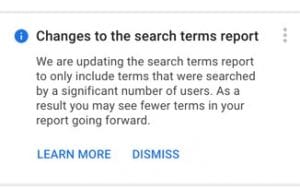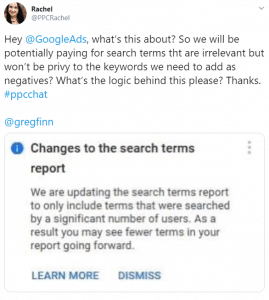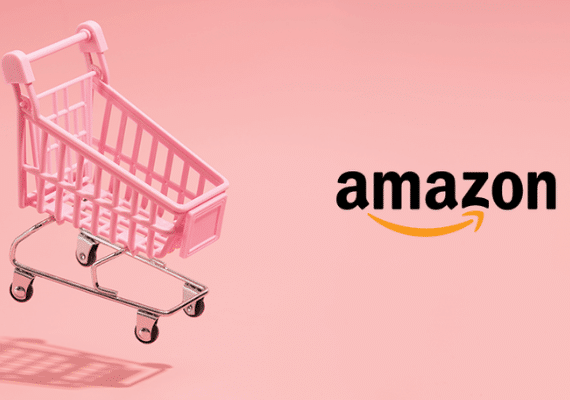Earlier this month, Google Ads account managers saw a pop up which mentioned about changes to the search terms reports and the queries shown therein. Here is what the message looked like:
Contents
What is changing?
A further click on Learn More in the above announcement reveals that:
Starting in September 2020, the search terms report only includes terms that a significant number of users searched for, even if a term received a click. You may now see fewer terms in your report.
What Google means by “significant” here is anyone’s guess!
What does this all mean?
To understand this let us first understand what is the search terms report?
Google Ads Search Term Report
Advertisers used the Search term data report for keyword mining i.e to find new keywords to add to your campaigns and also to find new keyword exclusions to prevent serving ads against irrelevant or low-value searches.
What are Google’s reasons for making this change?
Here is what Google had to say on why they have made these changes.
“In order to maintain our standards of privacy and strengthen our protections around user data, we have made changes to our Search Terms Report to only include terms that a significant number of users searched for. We’re continuing to invest in new and efficient ways to share insights that enable advertisers to make critical business decisions,” as told to Search Engine Land.
Why does this change matter?
As per the statement issued by Google above, if this is only to protect user’s privacy data then it makes sense. However, the explanation to the changes clearly states that they will not be showing queries which do not receive significant clicks (irrespective of whether they violate a user’s privacy or not).
There a numerous single click search queries that advertising accounts receive across various industries. If we sum up the cost that these single click queries receive, the results might be loss of a significant amount of money for advertisers, especially who operate in high CPC sectors ( legal, finance, etc.).
Advertisers won’t be able to determine if those queries should be added to negative keyword lists to make their campaigns more efficient. A good analysis of exactly how much search visibility might be lost because of this change can be found here.
So what might seem insignificant when we consider only one query might sum up to a whole lot when we add up all these low click queries and that is why this change has not gone down well with the advertising community.
Here are some initial reactions from the ad community on Twitter.
Source – Twitter
Source – Search Engine Journal
What can you do now?
If you have been affected by this change as much as other advertisers have, there is an immediate need to look at alternate options to continue with ongoing keyword research and mining to include new keywords or exclude unwanted ones. Here are some options that you could look at.
- Still continue using the search query report to work with the queries that are being shown. Even if they are reduced in number, they would still be valuable in weeding out irrelevant searches and adding relevant and new keywords.
- Look inwards, towards your own website. Implement search tools on your own site and work with search queries to identify what people are really looking for on your site.
- Consider Microsoft Advertising. The insights from their search term reports ( although low volume data) can be useful in identifying trends and related changes and can be plugged into Google campaigns.
- Look at third-party tools like SEMRush for keyword opportunities.
- Google Search Console data and Google Keyword Planner can also be used to identify search trends and you can use this information to support your paid ad campaigns on Google.
- And last but not the least, save your historical search term data by segmenting it for seasonal trends as this might or might not be available later if Google decides to pull this down as well.
What do you think of this change? Has this impacted your business? What are you doing to deal with it? Please let us know in the comments section below.
Also, if you are looking for expert advice on how to deal with this change and need help for your business, our digital marketing team is here to help. Get in touch!









